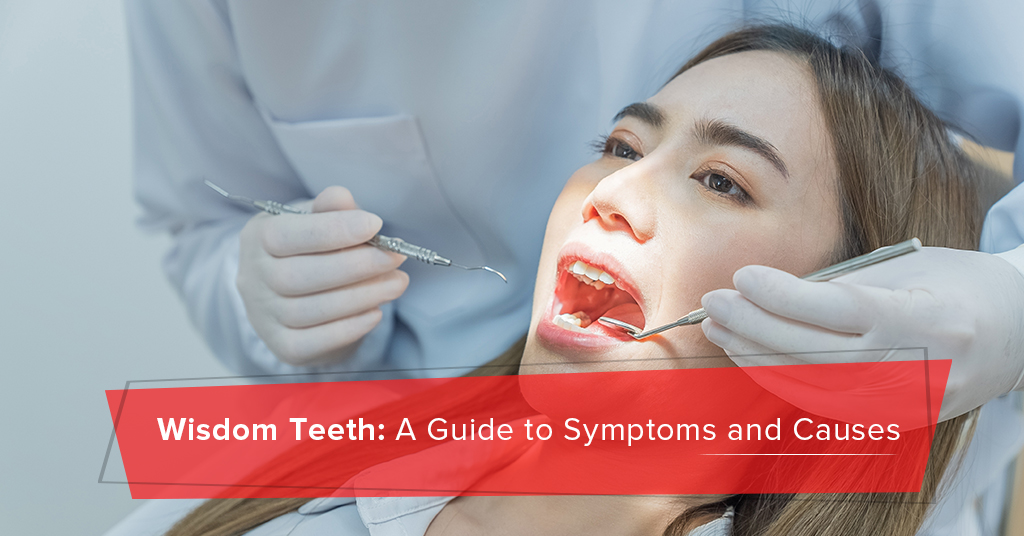Jul
Wisdom Teeth: A Guide to Symptoms and Causes

Ever heard of wisdom teeth? They’re those extra molars that erupt last at the back of your mouth. They usually appear either in their late teens or early twenties. They are notorious for causing pain, pressure, and bleeding, but this is not always true. This blog will shed light on the symptoms and causes of the occurrence of wisdom teeth.
Are All Wisdom Teeth Painful?
No, wisdom teeth are not inherently a problem in itself. The problem arises when they become impacted. By impacted, we mean when they cannot erupt properly. Let’s learn more about wisdom tooth impaction below:
A wisdom tooth is said to be impacted when it does not have enough space to emerge or develop properly. This can result in a tooth growing at an angle, remaining trapped in the gum or jawbone, or partially breaking through the gum. Usually, when a tooth is impacted, a soft lump of flesh develops over it. Due to friction or biting, this area often becomes susceptible to injury and is prone to bacterial infection and trapping food particles. All this can lead to pain, swelling, infection, and other dental issues. In many cases, dentists recommend extraction to prevent complications.
Symptoms of Impacted Wisdom Teeth
Here are some of the typical symptoms of wisdom teeth are:
- Red, swollen gums around the wisdom tooth area (signalling inflammation or infection).
- Chewing can become painful, especially on the side of the impacted tooth.
- Opening your mouth wide may feel restricted, making yawning or eating difficult.
- Trapped food particles around impacted wisdom teeth can cause bad breath.
- A lingering bad taste in your mouth can indicate an impacted wisdom tooth.
Conditions that Result in Painful Wisdom Teeth
Here are the top reasons that contribute to pain in wisdom teeth:
Impaction: As mentioned earlier, this is the top offender, causing pressure and pain in the surrounding area.
Infection: Partially erupted wisdom teeth create a perfect hiding spot for food particles and bacteria. This trapped debris can lead to an infection, bringing on a whole new level of discomfort.
Did you know?
Throbbing pain, swollen and tender gums, difficulty chewing, jaw stiffness, and bad breath can all be signs of a wisdom tooth infection? In some cases, you might even experience pus drainage or a fever!
If you’re experiencing any of these symptoms, schedule a dental appointment to get a diagnosis and treatment plan.
Gum Inflammation (Pericoronitis): Even without a full-blown infection, the pressure of an erupting wisdom tooth can irritate the surrounding gum tissue, causing pain and swelling.
Conditions that Might Not Cause Pain
If your wisdom teeth are erupting without any problems, you probably don’t require a dentist visit. The following are the indicators that your wisdom teeth are fine:
- If you feel no pain, swelling, or tenderness in the back of your mouth, your wisdom teeth are probably erupting fine.
- Normal wisdom teeth should not result in gum inflammation, bleeding, or redness.
- If your wisdom teeth are developing straight and parallel to your other teeth, they probably won’t lead to crowding or movement.
- If your wisdom teeth aren’t getting in the way of your bite or jaw function, they might not need to be removed.
- Affected or partially erupted wisdom teeth tend to catch food and bacteria, which can cause infections. If your gums are healthy, there is no immediate problem.
- Wisdom teeth that come in completely and cleanly have fewer chances of developing cysts, cavities, or other problems.
- If your previous dental X-rays indicated that your wisdom teeth were coming in correctly, they might not need to be extracted.
Even if your wisdom teeth are okay, regular dental checkups can assist in keeping them trouble-free. If you experience any changes, such as pain or swelling, see a dentist.
FAQs
Why Does My Jaw Hurt When My Wisdom Teeth Come In?
Jaw pain is one of the most prevalent complaints associated with wisdom teeth. This is due to the fact that wisdom teeth tend to come in with not enough room, leading to pressure and inflammation in the jawbone. This pressure can extend outward, leading to a dull pain or throbbing sensation in the jaw when chewing or opening your jaw.
Can Wisdom Teeth Cause Earaches?
Believe it or not, wisdom teeth can be the cause of earaches at times! Wisdom teeth roots are near the nerves that extend to the ear. When wisdom teeth are impacted or infected, the pressure and inflammation can irritate these nerves, leading to pain that radiates to the ear.
Can Wisdom Teeth Give You Headaches?
The pain and inflammation resulting from wisdom teeth may sometimes result in headaches. This is due to the jaw muscles tightening and becoming rigid as they attempt to accommodate the erupting wisdom teeth. Moreover, the referred pain from the jaw and the irritation of adjacent nerves may also result in headaches.
